-

After the Emerald Cup – Report From the Bodybuilding Stage
Report From the Stage
Recovery Beyond staff member, Jenn Boudreau, competed at the recent 40th Anniversary Emerald Cup Bodybuilding & Fitness Expo. Jenn, a seasoned bodybuilding competitor, was no stranger to the Emerald Cup.
After three thwarted attempts at joining the competition due to injury, pregnancy, and coaching, the 2017 Emerald Cup was previously her final appearance in the bodybuilding arena. “I’ve never put so much effort into anything in my life,” says Jenn, “Before, if I didn’t win my world was shattered. Now, my self worth is no longer tied to my placing.”
Bodybuilding helped Jenn maintain her substance use recovery. The gym was a space where she was surrounded by others who weren’t focused on drinking. “My first attempt at prep was my first attempt at sobriety as well,” she explains.
Growing Through the Years
Prior to taking the stage, the 2022 Emerald Cup proved different from previous years competitions.
As Jenn prepared to go before the judges, she noticed a shift in her mentality, “I think when I was younger, I was always fighting with my body and felt like I was trying to ‘punish’ it to get it to do what I wanted. This prep was more like coaxing it, and trusting that it was going to get there, even in the first few weeks of prep when I was still adding muscle so I didn’t see the scale move.”
This mindset translated to the competition stage. In previous years, Jenn struggled with the ever-changing standards of perfection. Bodybuilding judging is subjective. Competitors train to look a certain way, then might find the judges prefer a different body-type all together.
Striving for contrasting versions of the perfect physique took a toll on Jenn, “After so much internal turmoil of never being enough or never being good enough, and an injury, I put up my heels. Going on stage this time [in the 2022 Emerald Cup] I was in love with my body, I didn’t care how I measured up against the other girls, and I didn’t see one person who made me feel like I wasn’t good enough. I felt this not because everybody else wasn’t competitive or in shape, I just really liked my body and it had come through for me exactly on time, performed exactly how I needed it to and I was grateful for it.”
Overlap of Recovery and Training
Recovery Beyond is proud of the determination, commitment, and intention Jenn puts into all areas of her life. T
here are parallels between recovery from substance use disorders (SUDs) and training for a fitness event; it takes time, it can be painful, and it can be hard to trust the process.
Jenn explains, “Recovery from SUD requires that you do things that are uncomfortable, you have to force yourself to do things when you don’t feel like doing them and when it might even hurt to do them. Fitness, training for something in particular, is very good practice for the things you need to do to recover. You have to follow a workout plan/treatment plan. It hurts sometimes in the beginning (early sobriety is often painful) and you are sore and tired afterwards (completing the 12 steps or talking with a peer support counselor can have a similar effect emotionally you feel raw and exhausted).
The biggest difference is that fitness has tangible, measurable and visible results. You can see the transformation occurring and you get stronger and daily activities become easier.
When you realize that you can push through the pain, and the results are beyond what you ever thought you could obtain, a confidence and sense of pride or accomplishment develops. This often translates into other walks of life.
It’s easier for someone who has trained 16 weeks for something and knows that the results at the end of it are phenomenal, to push through the pain of recovery steps, where often there are no visible results, and trust that at the end of 16 weeks they will have accomplished something worth the pain.”
0 -

Recovery Beyond Sponsors Bodybuilding Competitor
Recovery Beyond, a local non-profit that facilitates healthy lifestyle and social support activities for people in recovery, is proud to sponsor Jenn Boudreau at the 40th Anniversary Emerald Cup Bodybuilding & Fitness Expo from April 29th-30th. Jenn, a seasoned bodybuilding competitor, is no stranger to the Emerald Cup. After three thwarted attempts at joining the competition due to injury, pregnancy, and coaching, the 2017 Emerald Cup was her final appearance in the bodybuilding arena. Now, she’s coming back to the same stage to revisit a goal she set for herself many years ago. “I’ve never put so much effort into anything in my life,” says Jenn, Recovery Beyond staff member and bodybuilding competitor. “Before, if I didn’t win my world was shattered. Now, my self worth is no longer tied to my placing.”
Bodybuilding helped Jenn maintain her substance use recovery. The gym was a space where she was surrounded by others who weren’t focused on drinking. “My first attempt at prep was my first attempt at sobriety as well,” she explains. “If I had had this group [Recovery Beyond] at the last Emerald Cup I probably would have won. I took second place in two divisions [at the 2017 Emerald Cup] and not because I didn’t have the physique but because I couldn’t stop drinking during that prep. I’m positive if I had not been drinking at all in that prep, I probably would’ve won…I’m coming back knowing that [drinking] won’t be the thing that stops me.”
Jenn recalls conversations she had with fellow competitors while working a Recovery Beyond booth at a bodybuilding event earlier this year. “[They] secretly wanted to make sure no one was listening to us and whispered, ‘I’m in recovery too.’ I told them literally every single person who has come to the booth has said that to us. They were baffled. They were falling over like, ‘What really? There are other people who like bodybuilding who are in recovery as well?’ They couldn’t believe it. It was great to be able to bring it to the competitors’ attention that most of them were in recovery.”
Recovery Beyond hopes that sponsoring Jenn will create awareness of substance use disorder and spread the word that there is a recovery community that enjoys fitness and healthy lifestyle activities as a pathway for recovery. Megan Fisher, the new Executive Director for Recovery Beyond, a person in long-term recovery, and an advocate for stigma reduction, shares what fitness did for her recovery. “I was close to two years abstinent from alcohol, but couldn’t put down the cigarettes. I got involved in a running group through my church and ended up slowly training for the Chicago Marathon. Every day, as I worked through my run/walk cycle, I reminded myself that a cigarette would destroy my goal. The community of supportive friends who had a common purpose drove me to keep showing up. I ran that marathon, I’m 14 years sober, and I’ve been smoke-free ever since!”
-
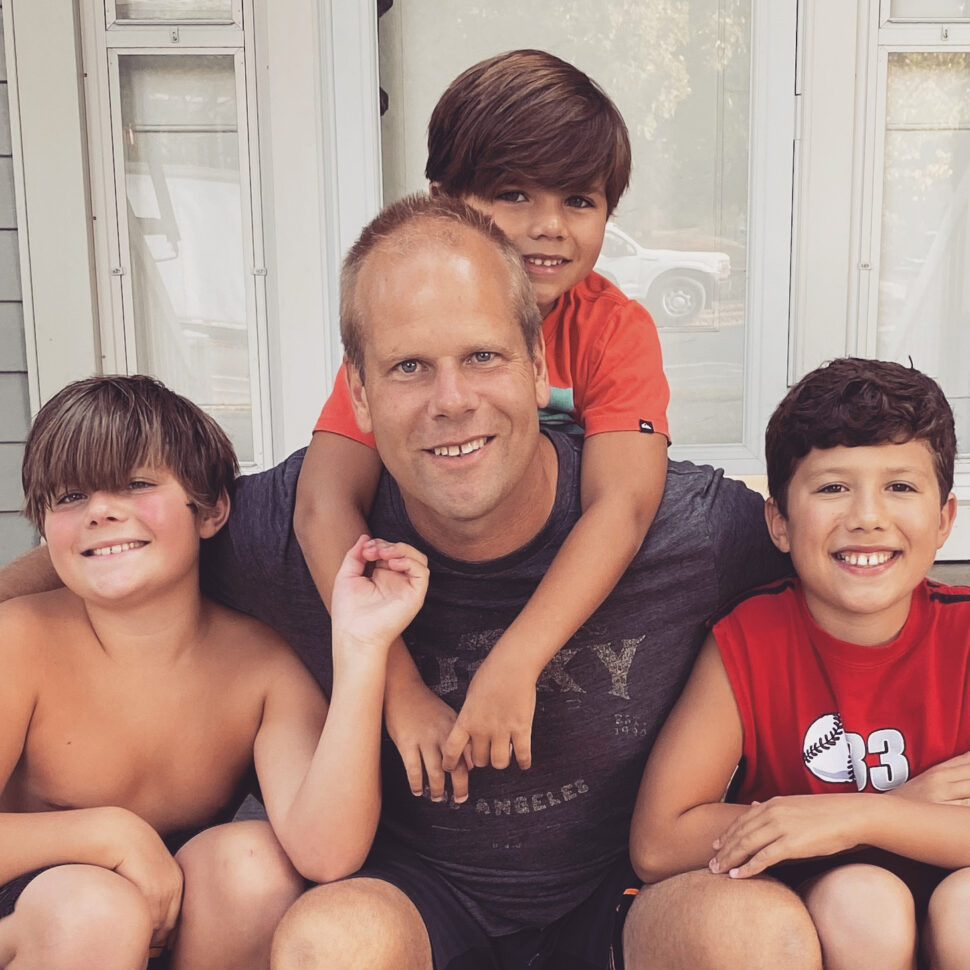
Recovery Beyond Welcomes New Director of Programs, Mark Adams
Mark Adams joins Recovery Beyond as the Director of Programs.
Recovery Beyond is excited to welcome Mark Adams as the Director of Programs. Mark brings over 20 years of experience creating and leading programs, experiences, and communities that teach and guide people toward more natural and joyful health as a way of living. Mark has a doctorate in Naturopathic Medicine from Bastyr University, a master’s degree in Exercise & Sport Science from the University of North Carolina-Greensboro, and an undergraduate degree from Harvard University. In 2005, he co-founded ONVO, a boutique whole body health community in the Bellevue-Seattle area that attracted more than 5,000 clients during its decade-plus existence.
Mark has a deep commitment to nurturing healthy lifestyles for others. He shares his vision for the role, “I hope to help bring an optimistic and holistic recovery lifestyle to our programs and, most importantly, to the lives of our participants. The reality is I constantly think about health and wholeness. The passionate ‘why’ of my career has precisely been about helping people live better, healthier lives in a more holistic, natural, and joyful way. My driving question for folks is, ‘Can you live it?’”
Mark found his way to Recovery Beyond through good friends who introduced him to the organization’s founder, Mark Ursino. After hearing the history of Recovery Beyond, Mark Adams was driven to support the mission. He hopes to facilitate healthy lifestyle activities in meaningful and lasting ways. He explains, “I would like to see Recovery Beyond grow as an active community that is known for its sense of family and a true spirit of living that animates and emboldens our programs and people!”
Originally from Indiana, Mark now resides in Issaquah with his three sons and 125-pound dog. He loves hiking, camping, and swimming in the PNW rivers and lakes. He and his sons collect their own local spring water for drinking and cooking.
-
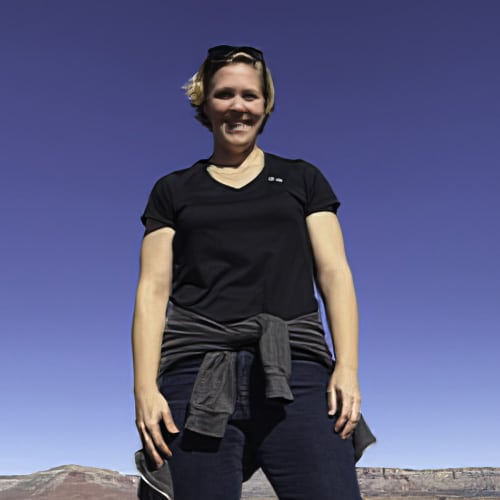
Meet Recovery Beyond Executive Director, Megan Fisher
Megan’s career in the substance use disorder (SUD) sphere began 11 years ago in a residential treatment program on the West side of Chicago. She describes, “It was a very rewarding first job in the field, but I did experience the first loss of a client. I still have a stuffed tiger that he picked out for me on a treatment outing to the local zoo as a reminder of how deadly this disease can be.” She then worked as a counselor in a prison treatment program and found great compassion and fondness for the men as they grew in their recovery. In this position, she began to develop managerial skills and became the Director of Addiction Services. Most recently, she worked for Community Mental Health Centers in program development and operations, grant management, community engagement, and strategic collaboration at the state and national levels.
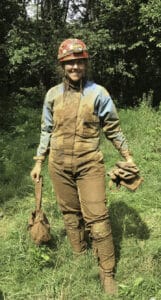
Lived experience with SUD led Megan to this line of work. She explains, “It was my personal journey in recovery that brought me to this field. Having come back from near-death and almost losing my child in the grips of substance use, it became a passion of mine to bring recovery resources and intimate connection to people caught in the miserable cycle of substance use. In my own recovery path, I discovered how beneficial physical activity is to my mental and emotional well-being. I also realized how much a healthy lifestyle community can be a bedrock for recovery stability. I live the mission of Recovery Beyond in my own recovery world and I am ecstatic to be a part of an organization that introduces and sustains these opportunities for others.”
It’s with this passion for getting together, for physical activity, and for sharing resources that Megan approaches the Executive Director role and emulates the vision of Recovery Beyond. She says, “We have all heard that substance use disorder is really a hole in our heart, something missing that we are trying to fill. That hole is connection – relationship. We get together to develop that community which will be our support and for whom we can be of service.” In addition to relationships and service, Megan is enthusiastic about anything active – from caving to hiking to boxing. She describes fitness as her number one meditation tool, “I feel most present and in the moment when I am physically involved, whatever the specific activity. I also stay engaged in support meetings and connect with others in recovery. Prayer and journaling are consistent practices of mine as well.”
Looking towards the future of Recovery Beyond, her vision is not only to create a diversity of activities for members to choose from but to expand the expedition element as well. This means more long-term goal-setting opportunities such as the Seattle to Portland ride and multi-day mountaineering trips. You’ll see an expansion of activities that, with consistent participation and commitment, will lead directly to large-challenge opportunities.
The power of Recovery Beyond is not just the mountain summit; it’s the human connections that are forged in hard work, discomfort, and commitment. Community building and relationships are cornerstones of the Recovery Beyond model. Megan sums it up, “We get together so that someone knows me well enough to see in my eyes when I am hurting and need a kind word. We get together to create memories of joy and zest so that we always remember that recovery is about allowing us to live life to its fullest. We get together because we are human and, at our core, we need companionship, understanding, love.”
We are thrilled to have Megan on the team. She brings great experience, perspective, and enthusiasm to the role. As someone who loves to make the most out of every opportunity, her thirst for life and adventure is infectious. This zealousness for the new and exciting will be a powerful addition to Recovery Beyond. We will be having a meet-and-greet with Megan on Sunday, January 23th, join us by signing up on our website calendar.
-

Acupuncture for Recovery
Acupuncture for Recovery

For those unfamiliar with the practice of Traditional Chinese Medicine and Acupuncture, acupuncture uses hair-thin needles to penetrate energy points along energetic meridians within the body to treat a variety of health issues. This type of medicine views the body holistically and strives to find an energetic balance and flow through our minds, bodies, and spirits. Acupuncture needles are quite small, bendable, and honestly, not much of anything to write home about. It’s a wonder they can evoke the magic they do given their size and flimsiness.
As I pulled into the Enso Center (https://ensocenter.org/) in Redmond, WA, I was immediately taken by the two buildings and the serene feeling I got while on the property. The building to the left was a large, two-story building with an enormous outdoor patio. The building to the right was a beautiful home with a sign for an acupuncture clinic, Mix Acupuncture and Wellness. Trees aligned the property and a trail lead its way from the park across the street up into the woods behind the buildings. I was going to meet Sharon, a licensed acupuncturist of five years, to talk about the community acupuncture clinic she is graciously offering to Recovery Beyond, and to learn more about how acupuncture can help treat addiction. I was also curious to see the Enso Center itself, as they are generously offering several classes to Recovery Beyond program participants and volunteers.
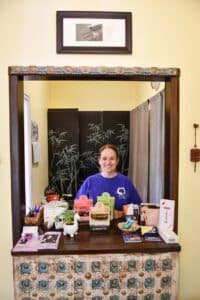 Sharon has been a licensed acupuncturist for the past five years. A graduate of the Seattle Institute of East Asian Medicine, she completed an internship at a methadone clinic in Seattle where she performed community acupuncture for those struggling with addiction (check out NADA – National Acupuncture Detoxification Association https://acudetox.com/). She and her husband, Jason, also went to Guatemala to offer health treatments to a community there, and both reveled at the power of acupuncture treatment on diabetics within this community. It gave me chills to listen to them talk about how, within a little over a week, they were able to observe blood sugar levels drop to healthy levels in diabetics using acupuncture.
Sharon has been a licensed acupuncturist for the past five years. A graduate of the Seattle Institute of East Asian Medicine, she completed an internship at a methadone clinic in Seattle where she performed community acupuncture for those struggling with addiction (check out NADA – National Acupuncture Detoxification Association https://acudetox.com/). She and her husband, Jason, also went to Guatemala to offer health treatments to a community there, and both reveled at the power of acupuncture treatment on diabetics within this community. It gave me chills to listen to them talk about how, within a little over a week, they were able to observe blood sugar levels drop to healthy levels in diabetics using acupuncture.Sharon and Jason own the Enso Center. They both exude a comforting, calm, aligned energy. Jason has been practicing martial arts for over 30 years now and offers a variety of classes at the center, from Qigong to Taekwondo to Archery. Sharon runs her acupuncture practice out of their home and her clinic promotes healing through it’s warm, inviting, and calm ambiance and her expertise. They kindly offered me a tour of the clinic and the center and let me try out these beautiful, ornate, antique vibrating bowls filled with water that stimulate the parasympathetic nervous system when you rub their handles (if you go, you must try these. I like a challenge and getting the bowls to vibrate was much harder than it looked.)
Why acupuncture for treating addiction, you might ask? It’s a complex explanation, but in essence, acupuncture treats all three parts of the person: the mind, body, and spirit. Addiction overpowers and consumes all three of these areas. Acupuncture lessens the intensity of the effects of detoxification on the body and stimulates the nervous system. It also releases energy blockages and nourishes energy deficient areas.
For those with addiction, Sharon recommends coming for a treatment either once a week or once every two weeks. She needles points in the ear to help treat addiction. The ear is considered to be a microcosm of the body; hence it can be used to treat the whole body. The treatment lasts about 30-45 minutes and is done in a community setting, where several others are together in a room also receiving a treatment. The community setting allows for people to heal together. While the needles are hair-thin, some people still prefer to have a needle-less treatment, which is absolutely a possibility. There are several options for this including acupressure (pressure applied to the points), beads (tiny stickers with metal beads that are attached over the points), tuina (massage of the points), cupping (cups applied to points where the skin is suctioned into the cup), and gua sha (gently scraping along the skin).
I highly recommend giving acupuncture a chance. The first community acupuncture clinic will be offered at the end of August. Check out Recovery Beyond’s calendar of events to register. You may hate it, but you might also love it. As Sharon shared with me, people feel relaxed afterward and it’s amazing to see people find a way back to their bodies again.

Acupuncture is not for everyone, but many do find relief from the practice. Always make sure to consult with your doctor prior to receiving a treatment and do not disregard professional medical advice or treatment before undertaking a new healthcare regimen or delay seeking medical advice because of something you have read in this article. Recovery Beyond is sharing this piece for informational purposes only, and none of this information is meant to be a substitute for professional medical advice, diagnosis, or treatment. Recovery Beyond does not provide medical advice.
-
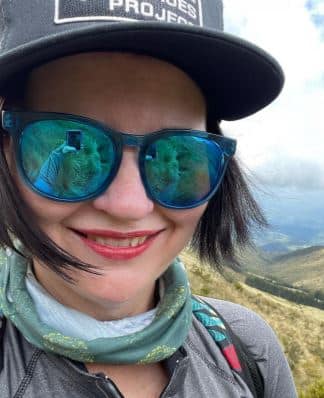
Becky Vinson: Service Gives Life
Becky Vinson’s military background was obvious as she led the latest Recovery Beyond climb team up Mt. St. Helens. She is comfortable dishing out orders and there isn’t a hint of compromise in her voice.
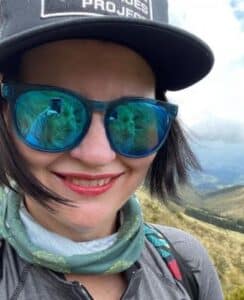
“Put on your packs. Break time is over.”
“We gotta pick up the pace.”
But there is more to Becky than toughness. Positivity and a can-do spirit radiate from every pore. It’s impossible not to love her. She is a force of goodwill.
Becky got involved with Recovery Beyond back in 2016 when she was providing veterans’ services at the Tacoma Rescue Mission. She was invited to become a volunteer on Recovery Beyond’s climb team. Now she also serves on the Recovery Beyond Advisory Team.
“I have no idea why I thought climbing Rainier would be easy,” she laughs. “I WAY underestimated it. I was the slowest one in the group. I had never done any serious hiking. My job was to boost everyone else’s self-esteem by always being dead last. But somehow I made it up.”
From her years in the Navy, Becky suffers with PTSD. As she climbed, she discovered something that surprised her.
“The rhythm of climbing became a tool to work out my anxiety. I was actually shocked at the mental health benefits. The pace is regular, like a metronome. Everything syncs to that pace. I don’t know how it works. It was an accidental discovery. But the more I hike and climb the more I understand that it is important to do activities that are strenuous. Climbing is grueling. But as I take each step, I work out the stuff inside. I’ve talked with lots of others about this and they all say the same thing.”

Spotting Becky sitting behind a desk is unlikely. Instead, you’ll find her with a backpack slung over her shoulder, making her way to the homes of veterans of WW2, the Korean War, and Vietnam. “Many of them are homebound due to war injuries and other significant chronic illnesses. I even manage people on ventilators. It’s a real honor taking care of these people who are literal heroes.”
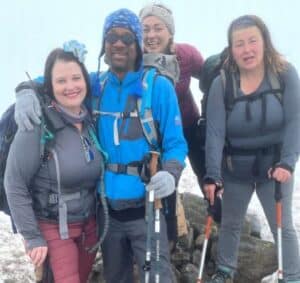
Becky also volunteers at the Neighborhood Clinic in Tacoma where she works with poor, homeless, and disadvantaged people. Prior to this, Becky started the Homeless Veterans Primary Care Team.“Homelessness is a deep, dark, black hole with no ladder. If you want out, you have to scale the walls. Lots of people give up.”
This strikes home for Becky. In high school, she was homeless herself. Her way out was the Navy. After serving from 1992-1997 she used the G.I. Bill to become a Registered Nurse, then paid her own way to become a Nurse Practitioner.
“I found a way out,” she says,”so I know it’s possible. I consider it a duty to help others find their way out too. I know what it’s like to be in that hole. And I know you can get out.”
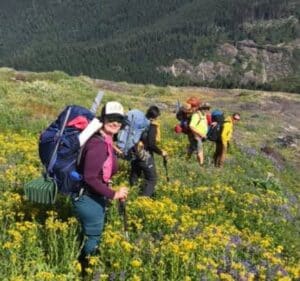 “Most people didn’t have cars and money to get to the V.A. so I went to them. I remembered what it was like to be on the streets. I asked myself where I would go and
“Most people didn’t have cars and money to get to the V.A. so I went to them. I remembered what it was like to be on the streets. I asked myself where I would go and
started looking. Sure enough, I found them there.”Becky offered medical assistance right on the street and helped people find housing and other benefits. “Homeless people always have multiple things going on. Almost always there is addiction. But also, mental illness, various forms of abuse… Some people think it is hopeless. I don’t. There’s always a way. I just take it one issue at a time.”
In all her work, Becky considers trust her most powerful asset.
“These people have heard lots of promises that were not kept. It is critical that I keep my word. I tell them I’ll be here every week at a certain time. I invite them to come see me and check-in. I tell them their situation won’t scare me off, that I’ve probably seen worse. I will be here. I will listen. Then it’s on me to follow through, every week, without fail.”
It works.
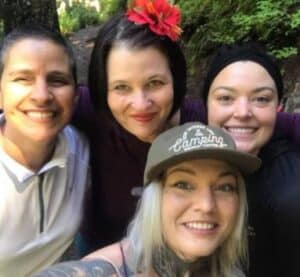
“People regularly say to me, ‘You’re the only person in this world I trust.’ That is exactly what I want to be. If there is one supportive, reliable person in your life, it’s a game-changer.”
“If I had a magic pill to fix addiction, I’d prescribe it. I don’t have one. I can give pills for blood pressure. Or diabetes. But I can’t cure addiction. That’s why mountaineering is important and why I volunteer with Recovery Beyond. It’s a tool. It helped me. It helps others. The exterior mountain is an exact parallel of the inner mountain. Climb one and you climb the other. It’s more than a metaphor. It’s a fact.”
“Being able to make it out of homelessness and to help others do the same—honest to God, I feel like the luckiest person alive. In fact, I know I am. I’m happy. I love living this life. I’m surrounded by great people. I wake up every day, look in the mirror, and like who I see. The rewards for my own mental health are outstanding. This is the best I’ve ever felt. By helping others, I get to feel normal. Man, it’s a great feeling. I want everyone to feel it too.”
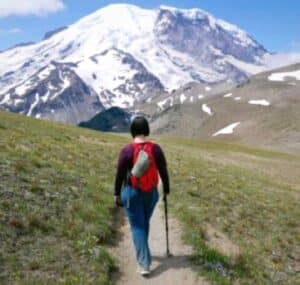
Story written by Maury Robertson
-
-
-
-

Program Spotlights
Recovery Beyond > Program Spotlights
